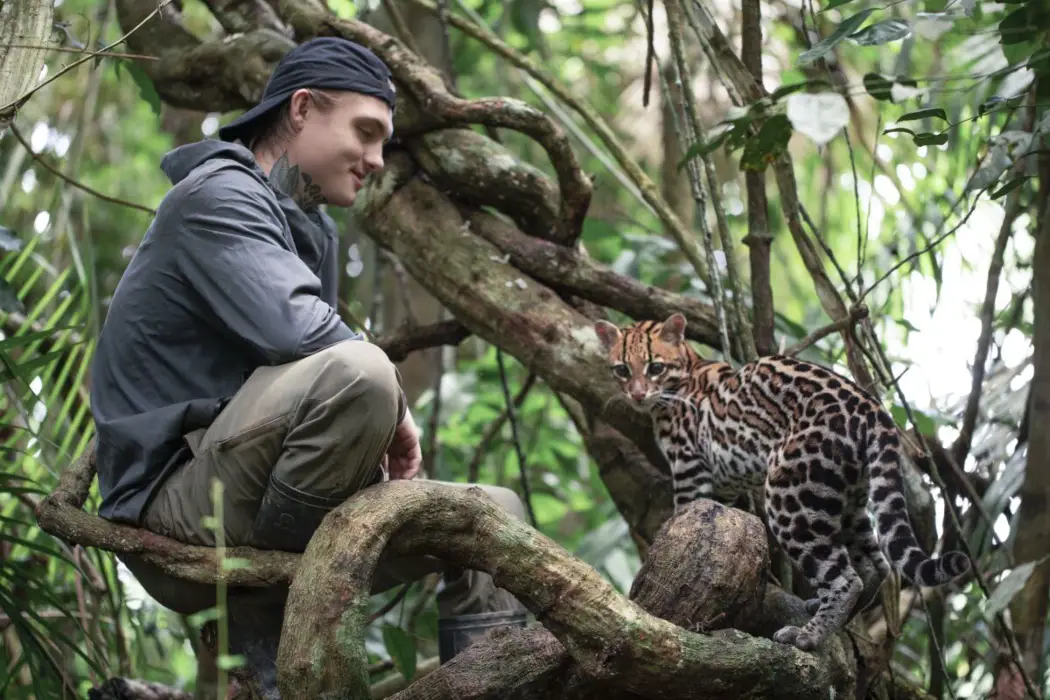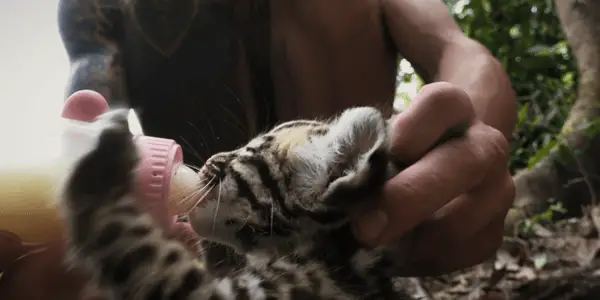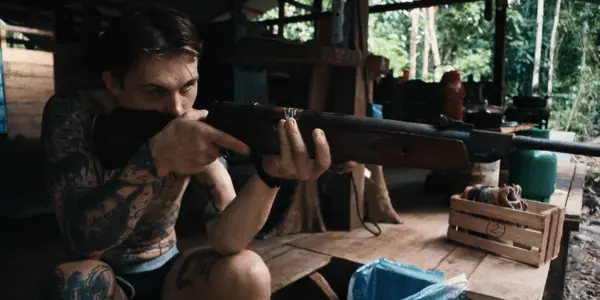WILDCAT: Nature’s Cure For Humanity

Soham Gadre is a writer/filmmaker in the Washington D.C. area.…
A recent book, Bessel van der Kolk’s The Body Keeps the Score, about dealing with PTSD and other forms of trauma and depression stemming from horrific experiences has passages of a U.S. Vietnam veteran describing the murder and rape he committed against innocent Vietnamese women and children during the war. War’s incomparable violence is inflicted both on the victim and perpetrator but this is not done in equal measure. Much of Europe and America’s ideas of war post-WWII reside in the vague but real effects of the trauma of witnessing brutality and in many cases, actively participating in it. It’s one of the reasons why a film like Wildcat, despite all its good intentions of stringing together the ‘beautiful’ parts of life on this Earth as a way to heal from its terrors, remains disappointing in keeping those terrors vague and distant.
Conservation and Rehabilitation
On its face, this is a standard documentary about wildlife conservation. It centers on the efforts of Samantha Zwicker and her project in the Amazon to help baby animals, whose parents have been killed off by a number of human-sourced activities like deforestation and poaching, be rehabilitated and reintroduced into the wild. But it incorporates elements of therapeutic possibilities of conservation efforts by centering most of its drama around Harry Turner, a British war veteran who fought in Afghanistan and suffers from PTSD. His depression and general jaded view of the world are softened through the rehabilitation of a baby Ocelot named Keanu.

Zwicker and Turner’s time in the jungle and their relationship with the ocelot as well as one another take up most of the film, which curiously obscures the greater details of the project that Zwicker operates on and the traumatic events that shaped Turner’s current mental state. Instead, the movie takes it on faith that its audience will find it enough for Zwicker to have the right intention – which might be the right assumption considering this will most likely only play for Americans and Europeans. It also takes it on faith that Turner’s plight of witnessing what he did in Afghanistan is enough of a condemnation of the war itself, though the movie hardly acknowledges how any of these things tie or relate to one another.
Threats in the Jungle
It’s rather interesting that the movie does explicitly have Zwicker mention how the loggers and poachers who threaten the habitats of the ocelot don’t hold the real power of the decision-makers, who are the politicians and industry titans but perhaps does not dare talk about how young men like Turner are constantly fed into death by a war machine controlled through those same politicians and billionaires. It’s not that a documentary necessarily requires being a fountain of educational information – Werner Herzog’s Grizzly Man allowed his subject to do the talking and even most of the filming. The handheld camerawork by Turner and the footage of the ocelot itself are as mesmerizing and cute as any cat video you might find on the internet.

Similar to Pallas’s Cat, ocelots are a great fascination for humans because they fulfill both the requirements of being a manageable domesticable cat (they’re smaller than most wild cats and famous people like Salvador Dali have owned them) while also technically being exotic and wild. Likewise, the ability to care for another living creature, outside of humans, is often a proven therapy for PTSD in humans. There is a grander philosophy and political weight at play beyond simple observation and documentation of animals here that doesn’t get enough questioning.
Conclusion
Wildcat seems a little too satisfied with obscuring the important political contexts for what surrounds Zwicker and Turner’s experiences. If the project of the ocelot is key to both the former’s conservation efforts and the latter’s therapy, then it should have some threads that stretch beyond the immediate realities of the jungle. For a film that creates importance in the ways humans and animals and nature can have mutually beneficial existences, it seems disingenuous to leave out the realities of the planet they exist on, the political and social webs that conflict with the mutual benefits.
Wildcat was released on December 21, 2022 for steaming on Amazon Prime Video
Watch Wildcat
Does content like this matter to you?
Become a Member and support film journalism. Unlock access to all of Film Inquiry`s great articles. Join a community of like-minded readers who are passionate about cinema - get access to our private members Network, give back to independent filmmakers, and more.
Soham Gadre is a writer/filmmaker in the Washington D.C. area. He has written for Hyperallergic, MUBI Notebook, Popula, Vague Visages, and Bustle among others. He also works full-time for an environmental non-profit and is a screener for the Environmental Film Festival. Outside of film, he is a Chicago Bulls fan and frequenter of gastropubs.












